How Harrogate-based Yorkshire Tea is made high in hills of Rwanda in factories like Sorwathe and Rugabano
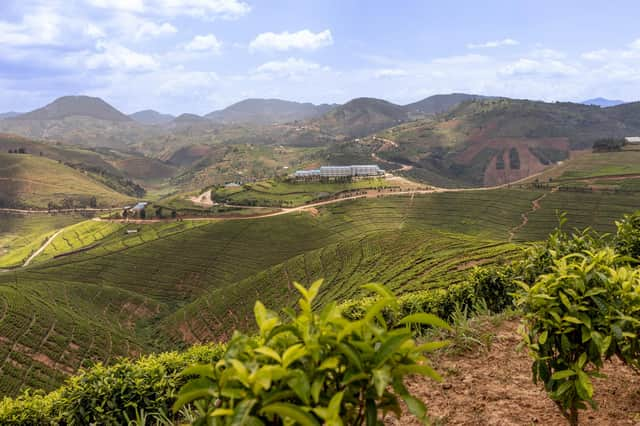

It is here that a contingent of employees from Yorkshire Tea visit Sorwathe Ltd, a remote hilltop factory some 2,000 metres high, surrounded from all vantage points by a popular plant that ends up - after many hours and miles - steeping in mugs across the UK.
When the plantation’s director general Rohith Peiris arrived in Kinihira 14 years ago, he says, the hills around the estate were much less populated but now homes can be seen dotted across the verdant landscape as people have come to find work.
Advertisement
Hide AdAdvertisement
Hide AdA community has formed in the decades after the factory opened, with locals witnessing the development of infrastructure such as a hospital and police station.
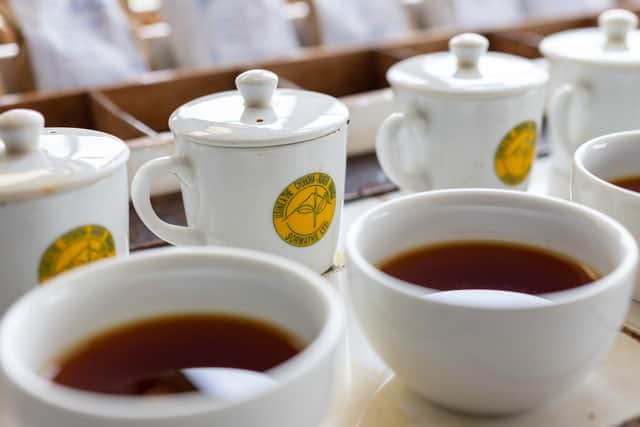

As Rohith, who is originally from Sri Lanka, says: “There is so much good you can do for the livelihoods of people with tea.”
The east-central African country’s tea industry only started in the 1960s but its ideal growing conditions create produce which experts have since found hard to resist.
Suzy Garraghan, senior tea buyer at Bettys & Taylors of Harrogate, has travelled in Africa, India and Indonesia to identify the best products for its Yorkshire Tea brands and is excited by what Rwanda can offer.
Advertisement
Hide AdAdvertisement
Hide Ad“East African tea, particularly Rwandan, it’s really high grown (in terms of altitude), it grows in rich mineral, volcanic soils and for that reason it makes the tea what we call really ‘brisk’ and really refreshing and also, because of the high grown nature of it, it gets a real floral, citrus character to it as well.”
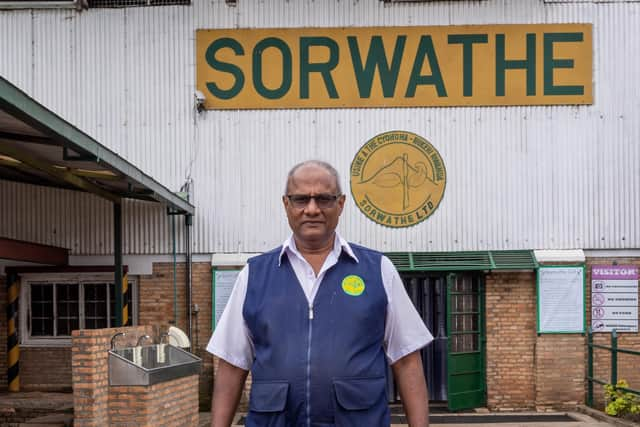

The scent of mountain dew experienced on early mornings around Sorwathe “translates into the tea,” she says, establishing that taste of ‘briskness’ which can be blended with other flavours from around the world.
For example, tea from the state of Assam in north-eastern India is grown at lower altitudes and depends on seasonal humidity, becoming thick, rich and malty - “gutty” or “guts” in tasting parlance - and is blended with the Rwandan.
Boxes of the premium Yorkshire Gold brand include a blend of tea from Rwanda, Kenya and Assam, while Rwandan tea is also used alongside other countries’ produce for Taylors of Harrogate’s Yorkshire Tea and Hard Water products.
Advertisement
Hide AdAdvertisement
Hide AdToday, the North Yorkshire company says that it buys around 15 per cent of Rwanda’s total tea production and 20 per cent of its own purchases come from its estates, which include Sorwathe, Gisovu, Nyabihu and Pfunda.
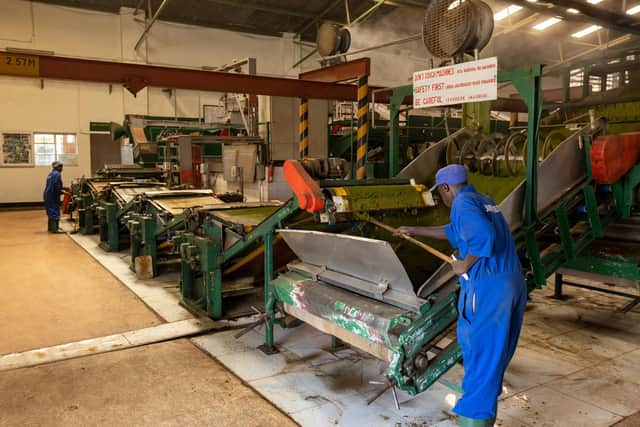

Sorwathe, a US-owned company founded in 1975, produces black tea which is shipped to the UK and bagged for boxes of Yorkshire Tea.
The factory's boards show that in 2021, Sorwathe made more than 3.5 million kilograms of black tea. In September this year alone, more than 323,000 kgs of tea went through the facility.
This has been hand-picked - to preserve quality - from the 2,000 hectares of tea plants, mainly in the Rukeri and Cyohoha valleys below. Sorwathe directly employs around 2,400 people and works with thousands more farmers, with whom it shares expertise and offers interest-free loans.
Advertisement
Hide AdAdvertisement
Hide AdThe factory operates 24 hours daily, in three shifts, with the first batch of fresh tea leaves arriving between 10am and 11am in the morning.
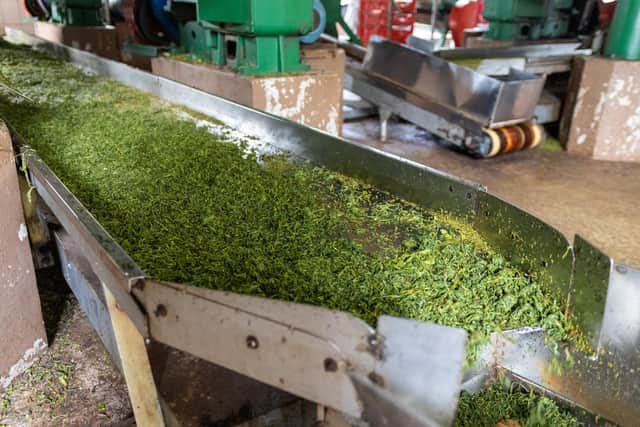

When trucks filled with crates of leaves arrive, an analyst takes a 100g sample, with tender and mature shoots separated - there should be more than 66 per cent of the former.
Then begins the process of withering - a form of air drying for between 12 to 16 hours. This has two main objectives: to reduce the moisture content and to enable chemical and physical changes.
This process continues as the leaves are then rolled in CTC (crush, tear and curl) machines.
Advertisement
Hide AdAdvertisement
Hide AdAfterwards, the leaf goes through a stage of fermentation, where oxidization takes place and the tea starts developing colour, flavour, strength and aroma.
For this, it needs “temperature and time,” says the factory’s chief processing officer Patrick Dusabimana - around two hours and at about 30C, with staff trained to monitor the process by colour and smell.
Fermentation must be stopped when the colour, flavour, strength and aroma are at their best, so the tea is sent through dryers where hot air is blown through the leaves at 140C, then 100C, and again at 90C. By the end of the 20-minute process, the moisture content of the made tea needs to be between 2.7 per cent to four per cent.
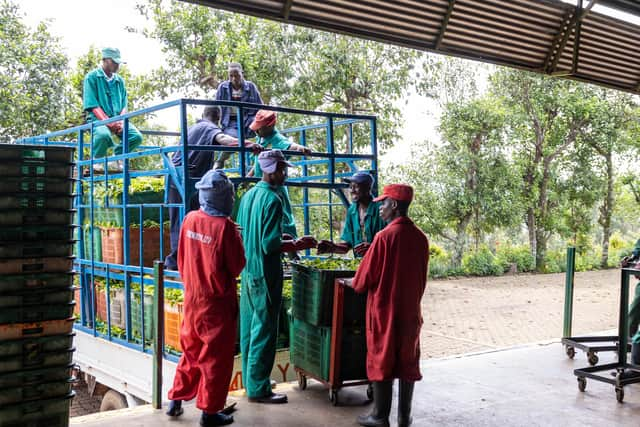

The final stage is grading and the dried tea is sent through sifters with different mesh sizes.
Advertisement
Hide AdAdvertisement
Hide AdSome buyers place importance on the size because they value tea based on appearance, but Suzy, speaking in Harrogate after the visit, says: “We’re putting it in a tea bag, I’d like it to taste really good, I’m not too bothered about what it looks like.”
She adds that “there’s a really lovely smell and it’s very specific to fresh tea coming out of the dryer and it’s full of what we call ‘bloom’” - where it achieves “a little coppery glow”.
“If you continue to sieve that tea,” she says, “you lose a bit of the bloom and lose a bit of the quality”.
Yorkshire Tea has therefore created its own specifications with the factories to get what it wants, in order to manage any conflicting requirements that other buyers might have.
Advertisement
Hide AdAdvertisement
Hide AdFactories send samples which are tested for quality at Pagoda House, Yorkshire Tea’s home in Starbeck, Harrogate.
In Rwanda, once packed, wagon drivers transport the tea to Kenya, where it is sent by sea from Mombasa to Middlesbrough, docking at Teesport.
Sorwathe, though, is not only dedicated to tea, but to improving lives.
The visit in October came just before the Yorkshire Tea Cup, a tournament for youngsters organised by the Cricket Builds Hope charity, which has set up coaching programmes with funding from the Harrogate company.
Advertisement
Hide AdAdvertisement
Hide AdBut they took inspiration from Rohith, who had previously forged cricketing links and encouraged young people around his estate to take part in the sport.
Sorwathe is also helping children to stay in school by contributing to the Porridge Project, which provides food for very young pupils in the area.
Pélagie Uwanyirigira, social affairs officer for Sorwathe, says that the scheme means that “all (the) children are healthy” and it “reduces dropout in the class”.
Since 2012, Taylors of Harrogate has invested more than £1million in various community projects in Rwanda related to its tea and coffee operations, excluding the funds put towards cricket projects.
Advertisement
Hide AdAdvertisement
Hide AdTraining and leadership opportunities, water and sanitation, nutrition, community development and agro-forestry schemes have all formed part of its work abroad in recent years.
The company has worked closely with the Ethical Tea Partnership - of which it is a founding member - and the Department for International Development (DfID) to improve lives, but also boost the yields and quality of tea grown in Rwanda.
Yorkshire Tea also trades with the Rugabano Tea Company factory in the western province of Karongi, run by a joint venture of Kolkata-based Luxmi Tea and The Wood Foundation Africa. The business aims to create more jobs, improve incomes and develop infrastructure in the region.
The Wood Foundation, Gatsby Foundation and the UK’s DfID previously established the Rugabano Outgrowers Services Company, which provides a range of services and financial help so that smallholder farmers can enter the tea business.
Advertisement
Hide AdAdvertisement
Hide AdAs of this month, some of Rugabano’s tea will start to be introduced into the Yorkshire Gold tea bag blend.
While some 3,000 farmers work with Rugabano, acting manager Bikramjeet Singh Gill expects this to grow to around 10,000 in the coming years, which including their family members means the site could impact 30,000 to 40,000 lives, he says.
That’s important to him because he sees the factory not just as an investment for the company, but for future generations too.
“You plant a tree and then it’s there for a lifetime,” he says. “You might not be there; the tree will be there to tell your story.”